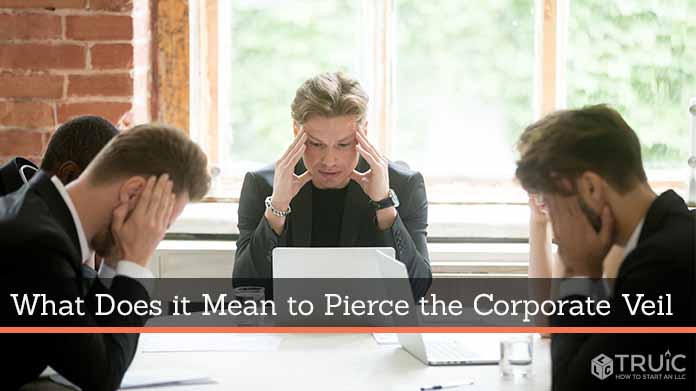What Does It Mean to Pierce the Corporate Veil?
Starting a business requires enormous personal and financial commitment. Before taking this leap, it’s important to understand what you stand to gain or lose. Some entrepreneurs choose to go it alone, operating as sole proprietorships or partnerships, while others take the next step toward incorporating or forming an LLC.
One of the most attractive features of forming a registered business entity like a corporation or an LLC is the personal liability protection it provides through the existence of the corporate veil. It’s important to understand, though, that this protection is not impenetrable. This article will look more closely at the corporate veil, why and how it protects business owners and shareholders, how these protections can be lost, and what you can do to keep your corporate veil intact.

What is the Corporate Veil?
The corporate veil is a legal concept that separates a corporation from the personalities of its shareholders. The significance of the corporate veil lies in its creation of limited liability. If a business is considered a completely separate entity from its owners and managers, those individuals cannot be held personally responsible for the actions of the company. Any action taken against a business to recover debts or other obligations can only target the assets of that business. It limits shareholders’ liability to the amount of money they have invested into the corporation.
While this concept originated in corporate law, these protections apply to limited liability companies (LLCs) in equal measure.
Why the Corporate Veil Exists
Generally speaking, commercial activity has an overall positive effect on society by creating jobs and wealth, meeting consumer demands, and promoting innovation. But, starting and investing in new businesses can be a risky pursuit. According to the Small Business Administration, about 30% of new businesses fail during the first two years, 50% during the first five years, and 66% within the first 10 years.
The concept of the corporate veil exists primarily to reduce this risk. Limiting shareholder liability essentially transfers the risk of doing business from investors and shareholders to their creditors. This shift in risk is an important incentive for entrepreneurs. While it does not eliminate their risk of failure, it limits their potential losses to no more than their actual investment in the company. This accomplishes several things that create a more favorite business environment.
- It encourages investment. Many new businesses get started by raising capital from a number of small investors, including friends and family. Limited liability allows these investors to make a small bet on a new business without facing the risk of personal financial ruin if the venture fails. Thanks to the corporate veil, investors can choose exactly how much they’re willing to risk on a particular business.
- It promotes diversification: n the absence of limited liability, shareholders would find themselves more concerned with the day to to day activities and decision making of each company where they’ve invested capital. The time and money required to monitor these business interests would significantly limit the number of ventures in which they could invest. Thanks to limited liability, they can investors their returns by making smaller investments in a larger number of companies.
- It allows for the transfer of corporate stock: One of the benefits of incorporating is the ease with which shares of a company can be bought and sold. This creates a simple process for both bringing on investors and selling or transferring ownership of a company. This process is made possible by the corporate veil. Without limited liability protection, creditors would likely place restrictions on stock transfers or require the transferring shareholder to retain liability for the transaction. This would limit trading activity and potentially affect the stock prices of publicly traded shares. Because of the corporate veil, the individual personalities of each shareholder is irrelevant.
Why the Veil Can Be Pierced
While the corporate veil and limited liability play a vital role in fostering a strong commercial environment, the protection is not unlimited. Just as it creates powerful incentives for investment and entrepreneurialism, so too can limited liability create perverse incentives that lead to corporate abuse, fraud, or other illicit activities.
For this reason, there are circumstances under which the courts will pierce the corporate veil to hold shareholders personally liable for business obligations. While veil piercing is the most litigated issue in corporate law, courts have generally sided with shareholders, maintaining their limited liability in all but the most extreme cases.
Despite the absence of a true doctrine to guide these cases, courts have historically pierced the corporate veil to accomplish one of three main goals.
- Prohibit fraud: Limited liability protection is designed to protect shareholders from corporate obligations they could not have foreseen or prevented. This protection, however, will not apply if a business has been found to be using the corporate veil to intentionally defraud creditors.
- Prevent intentional wrongdoing: Beyond fraud, there are a number of other actions taken by businesses that the court may see as intentional wrongdoing unworthy of corporate veil protection. In these cases, shareholders take advantage of limited liability protection for their personal gain at the expense of their creditors and others. A common example is seen in bankruptcy cases when corporate veil protection is used to transfer corporate assets outside of the company before they can be used to settle the business’ debts.
- Maintain statutory consistency: Finally, courts have been found to use corporate veil piercing in cases where the alternative would run contrary to other laws and regulations. This can apply to anything from violations of environmental law to the misuse of employee tax withholdings.
Factors the Court Will Consider
When deciding whether or not piercing the veil is appropriate, most courts will explore a number of common factors to make or break the case for piercing. The most basic condition necessary to disregard the corporate veil is when the individual and the company are so closely linked that they cannot be considered separate entities. In these cases, the court refers to the business as the alter ego of its owner or owners.
When employing the alter ego test, a court will examine a long list of factors. Some of the most common include:
- Commingling funds and other assets
- Shareholders treating the assets of the corporation as their own
- Failure to maintain adequate corporate records and formalities
- Failure to adequately capitalize a corporation
- Using a corporation for a single venture
From this list, two factors in particular are often given the most weight. They are the failure to maintain corporate formalities and the failure to adequately capitalize your corporation.
- Corporate Formalities: Corporations have certain legal formalities they must adhere to, such as issuing shares, holding annual meetings, preparing minutes, and creating and maintaining governing bylaws. When shareholders fail to maintain these formalities, it makes it easier for courts to find that the individuals and the company are not separate entities, and thus limited liability protection does not apply.
- Undercapitalization: If a business fails to invest or maintain a reasonable amount of money within the company to cover basic expenses and debts, it can appear that shareholders are purposely keeping money outside the business to avoid liability. If faced with legal action or obligations it cannot cover, a court may consider a lack of adequate capitalization as a factor in deciding to pierce the corporate veil.
It’s important to note that even in the presence of these factors when it comes to piercing the corporate veil, the most critical consideration is whether a corporation’s shareholders have committed intentional wrongdoing. In the absence of wrongdoing, manipulation, or other illegal activities, it is unlikely that any other tertiary factors will lead a court to invalidate limited liability protections.
Ways to Protect Shareholders and Personal Assets
It goes without saying that the best way to protect yourself and your shareholders from becoming personally liable for your business’ debts is to not commit fraud or other illegal activities. However, even the most honest and well run business will never be completely safe from lawsuits, bankruptcy, or other actions that may put their corporate veil at risk. For this reason, it’s vital that all business owners take the necessary steps to protect themselves no matter what circumstance they find themselves in.
Maintain Separate Identities
When it comes to corporate veil protection, maintaining a strict separation between you and your business is essential. This separation is the key to limited liability protection, and failing on this count will leave you open to personal liability. There should be no question that you and your business are two distinct entities. To ensure this separation, all businesses must:
- Keep business and personal finances completely separate
- Conduct all business and sign all contracts in your company’s name and not your own
- Create an operating agreement, even if you run a single-member LLC
Remain Compliant
Another important steps a business can take in maintaining its corporate veil is to follow all regulations and formalities and keep accurate and complete records. Whether you own a C corporation, an S corporation, or an LLC, following the rules at the time of establishing your business and throughout its life will make a significant difference when it comes to protecting yourself and your shareholders from personal liability. This includes keeping track of your business filings and transactions, staying compliant with all tax laws, holding regular meetings, and recording minutes.
Often times, smaller businesses will shirk on some of these responsibility because they have very few members or shareholders or are entirely family owned. This can be especially true for LLCs, where meeting requirements and other formalities do not exist. While the informalities of small businesses and LLCs make them an attractive option, it can also leave them much more vulnerable to having their corporate veil pierced. For this reason, holding meetings, complying with all legal requirements, and following other formal business practices is even more important for smaller, closely held companies.
Understand Your Risk
Although the courts have historically erred on the side of respecting the corporate veil, some companies are more likely than others to have their veil pierced.
- Contract cases end in veil piercing more frequently than torts.
- Companies with fewer shareholders are more likely to have their veil pierced.
- Piercing is more likely when the shareholder in question is an individual rather than another corporation.
- Smaller, privately held companies are far more likely to have their veil pierced than publicly held companies.
If you find your business falls into one of these categories, it is even more essential that you take the steps needed to protect your corporate veil.
Summary
The corporate veil has a long history of encouraging entrepreneurialism by creating a favorable environment for business owners and investors alike. While the limited liability protection the veil creates has become a mainstay of the corporate world, it is not designed to shield against fraud, misrepresentation, or other illegal activities. Because of this, courts have found reason to pierce the corporate veil and hold shareholders personally liable in certain cases of intentional wrongdoing or abuse.
For the most part, courts have been hesitant to revoke corporate veil protections, and will generally only do so in cases of clear and intentional wrongdoing. Despite its rarity, though, all business owners should take steps to insulate their corporate veil by complying with state and federal regulations, keeping accurate records, and maintaining a clear separation between business and personal assets and actions. If you take these steps, the corporate veil can be an excellent asset to you as you form, build, and grow your business.


